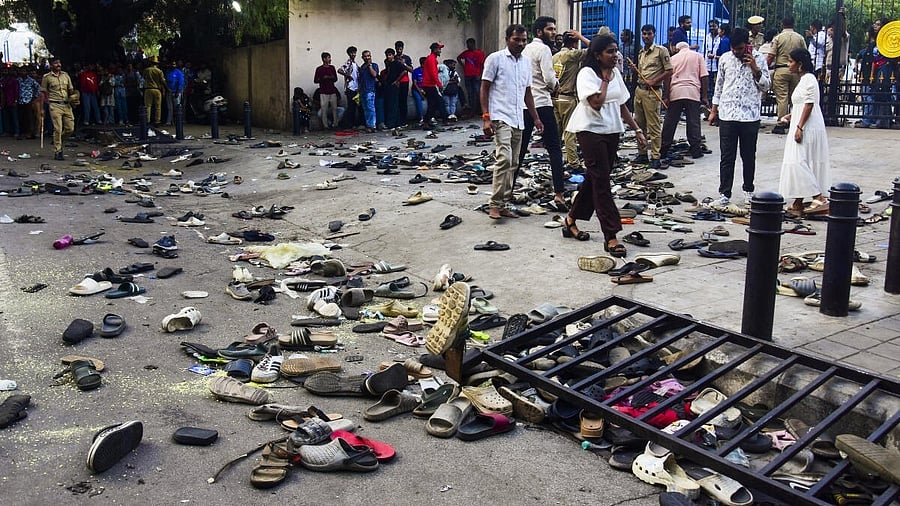
Footwear lie on the ground outside the Chinnaswamy Stadium following a stampede after a large number of fans gathered for the felicitation of IPL 2025 winning Royal Challengers Bengaluru team, in Bengaluru, Karnataka, Wednesday, June 4, 2025.
Credit: PTI Photo
In the wake of the tragic stampede during the Royal Challengers Bengaluru (RCB)’s victory celebrations in Bengaluru on June 4 that claimed 11 lives and left many injured, the Karnataka Government has proposed the Karnataka Crowd Control (Managing Crowd at Events and Venues of Mass Gathering) Bill, 2025.
The Bill seeks to establish a regulatory framework for organising mass events and introduces penalties for event planners and other stakeholders who fail to comply with the orders of the government.
While the government’s prompt response and intent to prevent future tragedies may be laudable, poorly drafted provisions and a lack of adherence to fundamental principles of criminal law undermine the Bill’s efficacy and legitimacy. Without careful revision and consultation with legal and event management experts, the Bill may end up being more punitive than preventive and ultimately fail to achieve its stated goals.
Surprisingly, despite being portrayed as a special law to regulate crowds, the Bill does not apply to religious events. This is conspicuous given the fact that religious events attract huge crowds and the tragedies at Hathras (where 121 people died) and the Maha Kumbh (official toll of 37) are fresh in our memories. When religious gatherings are not immune from unruly behavior and stampedes, the non-applicability of the proposed law to such events is patently under-inclusive and discriminatory.
It is pertinent to note that important terms such as ‘crowd’, ‘events’, and ‘event planners’ have been defined in a hazy and obscure manner that makes it hard to discern the scope of the Bill.
The Bill suffers from drafting errors, especially in the provisions about punishments for violations. To begin with, the Bill does not contain a clear definition of an ‘event planner’. Furthermore, although Clause 5 is titled ‘Offences by event planners’, the provision stipulates that the act of ‘any person’ disobeying the law or creating disturbance in any event which leads to death or injuries, shall be considered as an ‘offence by an event planner.’ This is baffling as it empowers the police to fasten criminal liability on undefined event planners for acts committed by ‘any person’.
Similarly, Clauses 4(2) and 7(2) stipulate that event planners who fail to pay compensation may be imprisoned and the government may auction their properties. However, the Bill does not define the term ‘compensation’ or prescribe a procedure to determine compensation. Unless compensation is defined to mean compensation decided by a statutory authority or a competent court, event planners run the risk of being jailed for not paying exorbitant amounts as compensation, determined by unauthorised groups in an extra-legal manner.
Strangely, the Bill appears to use the terms ‘event planners’ and ‘organisers’ (an undefined term) interchangeably, as Clause 5 (1) (b) penalises ‘event planners’
if ‘organisers’ fail to obtain permission for an event under Clause 3.
A knee-jerk reaction
What makes the proposed law draconian is the obliteration of the requirement of intention or knowledge for certain acts to be considered as offences. For instance, Clause 6(2) stipulates that an ‘intermediary’ (an undefined term) who even unknowingly provides a ‘platform’ (undefined) to any person who commits an offence under the Act, may be imprisoned for a period of up to three years, fined or both. Furthermore, according to Clause 6(3), ‘whoever’ even unknowingly funds an event or an act prohibited by the law, may be imprisoned for a period of up to three years, fined or both. Interestingly, the Bill is silent on the quantum of fine for several offences.
It would be fallacious to consider the Bill as a path-breaking attempt at regulating crowds and penalising organisers for hosting unlawful events. The Karnataka Police Act, 1963, and the orders promulgated under the Act have already recognised the police’s power to regulate crowds and events. Similarly, Commissioners of Police and District Magistrates have always had powers under the erstwhile Code of Criminal Procedure, 1973, Bharatiya Nagarik Suraksha Sanhita, 2023, and the Karnataka Police Act, 1963, to prohibit gatherings that pose a threat to safety and tranquility. Instead of proposing a vague Bill, the government ought to have examined whether the existing laws require amendments to address emerging challenges.
Renowned judge Oliver Wendell Holmes Jr had famously opined that the life of law has not been logic but experience. The proposed Bill is a knee-jerk reaction to a tragic stampede caused primarily by a systemic failure of governance and policing, as opposed to loopholes in the law. A draconian law is not an answer to the maladies plaguing public administration and governance.
(Sri Harsha is a PhD scholar at NLSIU; Rahul is an advocate)